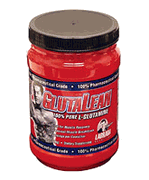|
Glutamine has become more prominent as new studies reveal its unique contribution to protein synthesis muscle growth, anti-catabolic (prevents muscle tissue breakdown) function and growth hormone elevating effects. Glutamine provides a critical link in muscle metabolism not shared by any other single amino acid. USN's L-Glutamine powder is pure, pharmaceutical grade L-Glutamine in an odorless and tasteless powder.
Glutamine is the most abundant single amino acid in the blood and in the intracellular free amino acid pool (most abundant amino acid in muscle tissue). It compromises 61% of the amino acid pool in skeletal muscle cell. In fact, Glutamine alone is responsible for 35% of the nitrogen that gets into the muscle cell. Glutamine literally drives muscle building nitrogen into the muscle cell where it is synthesized for growth.
Glutamine concentrations fall remarkably after training and remain low until complete recovery. What this means is, the very rigors of weight training "leak" nitrogen carrying glutamine from muscle tissue, counteract the fall in muscle protein synthesis, and improves nitrogen balance. Glutamine overcomes "The training Paradox".
You train with weights to build muscle. The more intensely you train, and the heavier the overload you subject your muscles to, the greater the growth response will be. Glutamine is a key factor in muscle growth, and to control the "skeletal muscle / whole body glutamate gradient". It is also critical in maintaining and building muscle tissue. The higher the muscle glutamate levels you can maintain, the less chance you have of falling into catabolism and the faster muscle will grow.
We all know growth hormone is an important anabolic hormone. The most important anabolic hormone! It regulates the metabolic processes (including protein synthesis) in almost all tissue throughout the human life span. Growth hormone provokes several anabolic actions on skeletal muscle: the uptake of glucose and amino acids, activation of muscle protein synthesis, suppression of muscle protein catabolism, and the utilization of body fat for energy.
|

